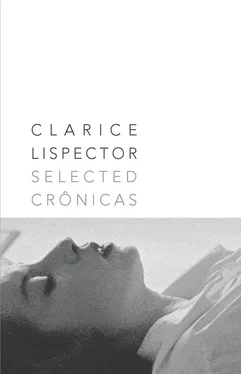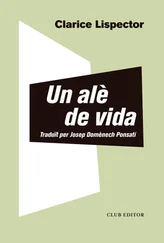Someone had given Aninha a red patterned skirt which was much too long for her. When she had a day off work, she would wear this skirt with a brown blouse. That was another sweet thing about Aninha. She had no taste whatsoever.
— You ought to get yourself a boyfriend, Aninha.
— I had one.
How come? What man could ever have fallen in love with her, for God’s sake? There is the answer: he did it for God’s sake.
THE CASE OF THE GOLD FOUNTAIN-PEN
I am going to call this the case of the gold fountain-pen . To tell the truth, there is no mystery. But nothing could please me more than to write something with at least a title reminiscent of Agatha Christie.
Some friends thought it would be a nice idea to make me a present of a gold fountain-pen. I had always written with a ballpoint pen or used a typewriter. But now that I possessed a gold pen, why not use it? It looks elegant and is of excellent quality. But then I came up against a problem I could not ignore. This was my problem: are the words written with a gold pen also made of gold? Would I be obliged to write more elaborate sentences because my implement was so much more precious? And would I end up writing in a completely different style? And if my style were to change, surely that would have the effect of changing me as well. But in what way? For the better? And there was another problem: what would happen if I were to find, like King Midas, that everything I wrote with my gold pen turned out to have the brilliance and unyielding hardness of gold?
As I said before, I did not pay too much attention to these little problems; thinking is not something I consider dangerous. And I can think without allowing it to upset me.
There was, however, a more serious problem to come. I had only been given one gold pen and I have two little boys. But I am racing ahead. Let me start at the beginning.
When my younger son saw the gold pen, his whole expression changed at once. After carefully examining the pen, he did not utter a word. But desire was written all over his face. The desire to possess something beautiful. His eyes shone in silence. I understood. He wanted the gold pen. It was quite obvious.
So I took the initiative: ‘I know what you’re thinking. You’re wondering how you can get your hands on my pen.’ He said nothing, torn between desire and remorse. He overcame his guilt and suggested without much enthusiasm: ‘You could have your name engraved on the pen before using it.’ I told him: ‘If I were to do that, then you would have to use a pen with someone else’s name engraved on it.’ Silence. Deep reflection. Then he replied despondently: ‘That’s true, but if I use it right away, someone might steal it from me or I could lose it.’ He was right. So we both started to think hard. My efforts paid off. I came up with an idea. ‘Listen, I’ll give you the pen when you finish high school. By then you will be grown-up, no one will try to steal it from you, and you yourself will know how to look after your things.’ ‘I suppose so.’ But he was still feeling remorseful, as if he were depriving me of a pen which rightfully belonged to me. Little did he know how much I enjoy seeing people take things away from me.
By the following day, any traces of guilt had vanished.
I could not find a pencil to write down a message and decided to use the gold pen. Just then my son walked into the room and caught me in the act. ‘No, that’s not fair!’ he complained resentfully. ‘Why not?’ I asked. ‘Surely you don’t mind me using the pen now and then!’ ‘But you’ll spoil the nib. Look, you’ve scratched it already!’ He was right: one day the pen would be his and I should have taken more care. So I showed him where I intended to keep it and promised I would not use the pen any more.
But I have two little sons. And I could not understand why the older boy had shown no interest. This saddened me. I would have preferred to see them quarrel over the gold pen rather than have one of them show no interest whatsoever.
I waited until we were alone. I then told him the whole story and concluded by saying: ‘If you had asked me first, I should have given the pen to you.’ ‘But I didn’t even know you had a gold pen.’ ‘Then you should have known, you go around with your head in the clouds and pay no attention to other people’s conversations.’ Silence. I asked helpfully: ‘But had you known that I had been given a gold pen, would you have wanted it?’ ‘No.’ ‘Why not?’ ‘Because gold pens cost a lot of money.’ ‘So you don’t think you should be given anything that costs a lot of money?’ ‘You’ve had other things which cost a lot and I never asked you for them.’ ‘Whyever not?’ ‘Because they belonged to you.’ ‘That wouldn’t have bothered me.’
We remained there in silence, not knowing what to say to each other.
Finally he decided to settle the matter once and for all and told me: ‘I couldn’t care less. So long as the pen writes, any old pen does me.’
No one could disagree, but I was far from satisfied. There was something about this conversation which was not quite right. I should have preferred to have been … well, who knows… how can I put it … I did not feel the least bit pleased, his answers upset me and I can say no more.
Suddenly, I discovered what was wrong. The gold pen did not really matter. What did matter was that one son had wanted it and the other did not. I pursued the conversation: ‘Come here, tell me why you don’t ask me for things.’
His reply was swift and bruising: ‘I’m always asking for things and you always say no.’
The cruelty of this accusation left me dismayed. Besides, it simply was not true. That made his accusation all the more serious. The child had been bearing so deep a grudge that he had transformed it into this terrible lie.
‘What are these things you asked for which I wouldn’t give you?’ ‘When I was little, I asked for one of those round things you blow up to float in the water.’ ‘And didn’t I buy you one?’ ‘No, you didn’t.’ ‘Would you still like one?’ ‘No, I don’t need it any more.’ ‘I’m sorry I didn’t buy you one.’ He took pity on me: ‘You don’t even remember. You wouldn’t buy me one because you said they were dangerous, that the thing would start floating on the waves and carry me out to sea, and that I was far too little and couldn’t swim.’ ‘Now I remember.’ But the sadness had still lingered.
The fountain pen had taken us far. I thought it wise to call a halt. So we said no more. Sometimes there is little to be gained by probing things too deeply.
Her name was Eremita. She was nineteen years old. A trusting face, some pimples. Where was the attraction? Yet there was something attractive about that body which was neither ugly nor beautiful, in that face where a sweetness craving greater sweetnesses brought a sign of life.
Beauty is perhaps the wrong word. There probably was no beauty there although certain indefinable traits attracted like water. There was certainly living substance; nails, flesh, teeth, a mixture of resilience and weakness, constituting a vague presence which could suddenly materialize in the form of a questioning head ready to do one’s bidding the moment you uttered the name: Eremita. Her brown eyes were indescribable and bore no relation to the rest of her face. As independent as if they had been planted in the flesh of an arm from where they could watch us — open and moist. Her whole being was of a sweetness close to tears.
Sometimes she would reply with the rudeness typical of maids. She explained that she had always been like that, even as a child. Yet it had nothing to do with her character. There was nothing hard about her, there was no suggestion of any perceptible law. ‘I was afraid,’ she would say quite naturally. ‘Boy, was I hungry!’ she would exclaim, and for some strange reason there was never any more to be said. ‘He has a lot of respect for me,’ she would say, referring to her boyfriend and, despite the cliché, anyone listening to her entered a delicate world of animals and birds, where all creatures respected each other. ‘I feel so ashamed,’ she would say, and then smile, enshrouded in her own shadows. If she hungered after bread — which she would quickly devour as if someone might snatch it away from her — it was thunder she feared, and having to speak which made her embarrassed. She was kind and honest. ‘God forbid,’ she would mutter, distracted.
Читать дальше












